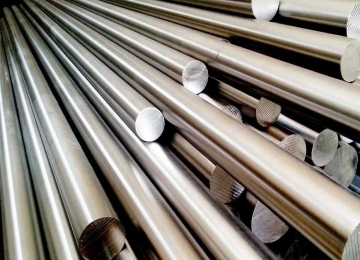
4J49 is a precision alloy, also known as internal suction alloy or glass sealing alloy. It is composed of elements such as iron, nickel, cobalt and chromium, and has a special chemical composition and physical properties that allow it to have an expansion coefficient similar to soft glass in the temperature range. This makes 4J49 alloy very suitable for matching sealing with soft glass.
When the surface of the 4J49 alloy is oxidized, a very dense oxide film will be formed. This oxide film is closely combined with the matrix and can well wet with soft glass. This property enables 4J49 alloy to achieve high-strength sealing surfaces and therefore plays an important role in the electric vacuum industry.
In general, 4J49 precision alloy is a material suitable for matching and sealing with soft glass, and has a wide range of applications in the electric vacuum industry and other fields
4J49 chemical composition
吾輩は猫である。名前はまだない。どこで生れたか頓と見当がつかぬ。何でも薄暗いじめじめした所でニャーニャー泣いていた事だけは記憶している。
Thermal properties of 4J49 precision alloy
The melting temperature of 4J49 alloy is about 1430℃
The specific heat capacity of 4J4 alloy is about 504J/(kg℃)
Thermal conductivity of 4J4 alloy:
λ/(W/(m·℃)) | ρ/(g/cm3) | ρ/(μΩ·m) |
18.0 | 8.18 | 0.90 |
4J49 linear expansion coefficient The average linear expansion coefficient specified by the standard is as follows (4J49 Curie point Tc=340℃). :
| /10-6℃-1 |
|
|
|
|
|
| |
20~300℃ | 20~400℃ | 20~100℃ | 20~200℃ | 20~300℃ | 20~400℃ | 20~500℃ | 20~550℃ | 20~600℃ |
8.6~9.3 | 9.4~10.1 | 9.0 | 9.0 | 8.9 | 9.6 | 10.9 | 11.4 | 11.8 |
αR/10-3℃-1 |
|
|
|
|
|
20~50℃ | 20~100℃ | 20~200℃ | 20~300℃ | 20~400℃ | 20~500℃ |
0.95 | 0.90 | 0.85 | 0.80 | 0.70 | 0.60 |
Magnetic properties of 4J49 alloy
At 4000A/m, the residual magnetic induction intensity Br=0.69T, and the coercive force Hc=27.2A/m.
4J49 chemical properties: The alloy has good corrosion resistance in the atmosphere, fresh water and sea water; it has good resistance to hydrofluoric acid corrosion.
H/(A/m) | B/T | H/(A/m) | B/T |
8 16 24 40 80 | 3.0×10-2 0.19 0.34 0.58 0.74 | 160 400 800 2000 4000 | 0.88 1.00 1.08 1.16 1.20 |
Properties of 4J49 alloy
4J49 alloy is a high performance precision alloy also known as Invar 49 alloy. The following are its main performance features:
Low thermal expansion coefficient
High dimensional stability
Excellent low temperature characteristics
good mechanical properties
Overall, 4J49 alloy plays an important role in applications requiring stability and precision through its low thermal expansion coefficient, dimensional stability and low temperature properties.
4J49 heat treatment system
Regarding the heat treatment system of 4J49 alloy, according to the information you provided, the heat treatment process of the sample is as follows:
Heating: Place the sample into a hydrogen atmosphere and heat it to a temperature of 1100℃±20℃. Ensure that the specimen is heated evenly and maintain this temperature for 15 minutes to allow the material to reach thermal equilibrium.
Insulation: At a temperature of 1100℃±20℃, the sample is kept for 15 minutes. This time allows the grains within the material to rearrange themselves to enhance performance.
Cooling: The cooling rate should be controlled at a speed of no more than 5°C per minute. The specimen needs to be cooled quickly after the insulation is completed. Cooling can take different forms, such as natural cooling or the use of cooling media.
Out of the furnace: The sample can be taken out of the furnace after cooling to below 200°C. At this time, the sample has completed the heat treatment process.
Please note that this is a heat treatment regime description based on the information you provided. In actual applications, adjustments may need to be made based on specific requirements and application scenarios. It is recommended to refer to the relevant material regulations
Application of 4J49 precision alloy
4J49 precision alloy is an alloy material with a wide range of applications. It is mainly used in the aerospace industry, electronics industry, communications industry and other fields. In the aerospace field, it is often used to manufacture parts in high-temperature environments, such as engine nozzles, turbine blades, etc. In the electronics industry, it is used to manufacture connectors, contacts and other components of electronic components. In the communications industry, it is often used to manufacture antennas, microwave connectors and other related equipment.
Special requirements for using 4J49 precision alloy
The special requirements for using 4J49 precision alloy are as follows:
Coefficient of expansion matching: In the application, the expansion coefficients of the selected glass and alloy should match. This reduces thermal stress caused by temperature changes and improves the material’s stability and durability.
Aluminum and cerium components: In order to improve the sealing strength between metal and glass, the alloy is allowed to contain certain aluminum and cerium elements. These elements can improve the sealing properties of the material and enhance the bonding force between the alloy and the glass.
Control grain size: During the heat treatment process, care needs to be taken to avoid excessively large alloy grains. Excessively large grains will lead to a decrease in the deep drawing performance and air tightness of the strip. Therefore, controlling the grain size is an important factor to ensure good performance of the strip.
Through reasonable selection of alloy formula and control of heat treatment parameters, these special requirements can be met to ensure that 4J49 precision alloy exerts excellent performance in applications.

